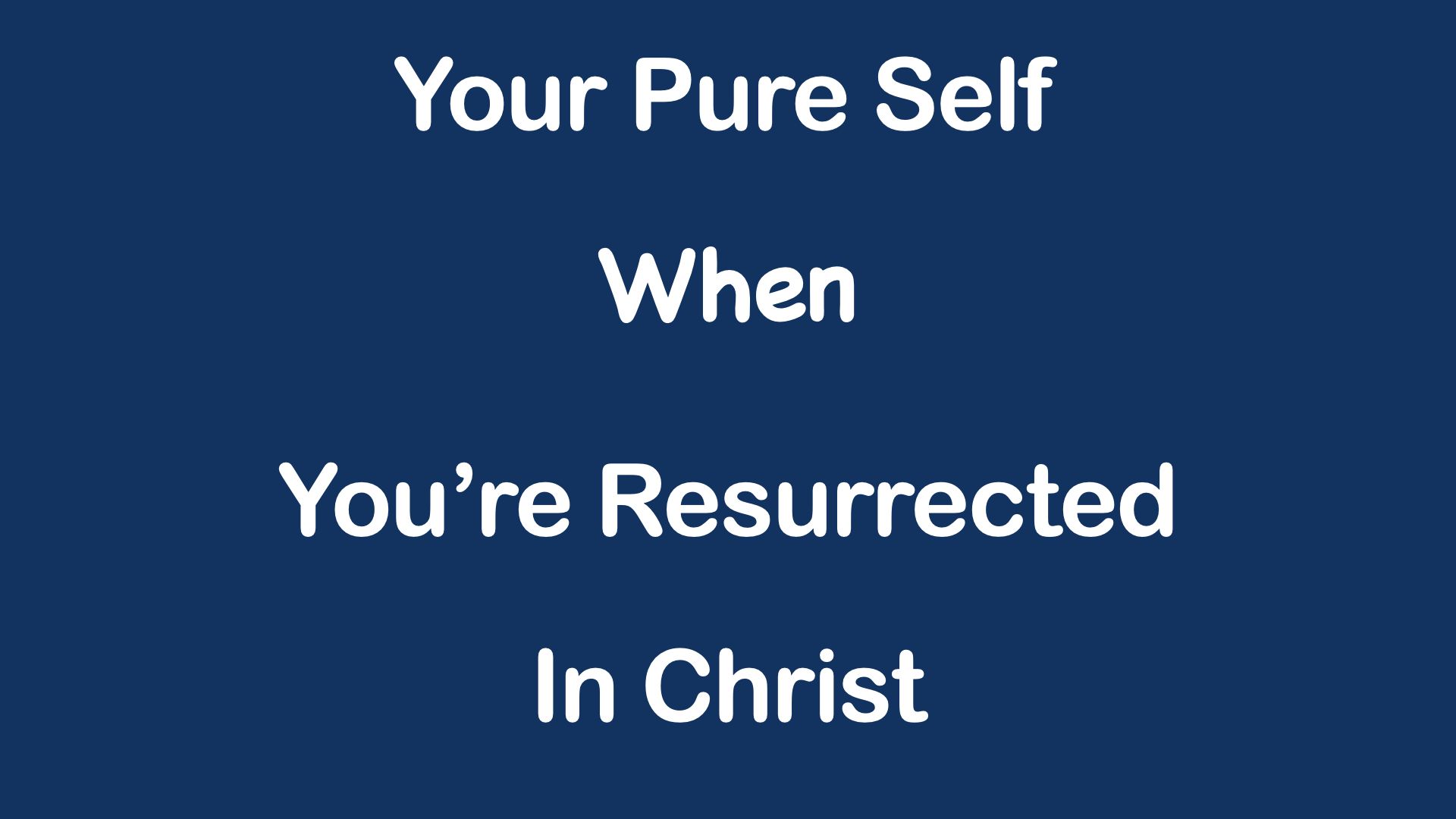|
|
Pure Self
This Bible study lesson on your Pure Self is the last of four Bible study lessons in the Who Am I Bible Study. This Bible study is designed to be done over a five day period. We provide the daily study questions on this page for you. There's a link at the bottom of this page where you can compare your answers.
In our last Bible study lesson on self-control, we explored the idea of self-control and the role of Holy Spirit in our sanctification. In this Bible study on our Pure Self, we'll explore the end result of our sanctification - which is our pure selves.
Day One - Pure Self Bible Study

When we left our last lesson we explored the idea that although we are to daily crucify our sins, our old selves. We're to nail them to the cross metaphorically. But we must fight any urge to remove them from the cross.
We recognized, and perhaps identified with, the mental picture of someone longing to rescue his or her sins from their doomed crucifixion so they might enjoy their fleeting pleasures for another hour.
We also recognized that we can win this daily battle to control ourselves because we're empowered by the Holy Spirit that lives within us. This daily fight is the process in our lives of progressive sanctification.
"Sanctification is a progressive work of God and man that makes us more and more free from sin and like Christ in our actual lives."1 Sanctification is a partnership between God and man. God allows us the free will to make daily decisions regarding the opportunities before us.
He also provides us Holy Spirit and the means to resist temptation (I Corinthians 10:13). Our part in this divine partnership is to choose to either serve ourselves or to serve God.
Being Your Self
The essence of being yourself is
when you are yourself before God!
Jones, G. Curtis. 1986. 1000 illustrations for preaching and teaching. Nashville, TN: Broadman & Holman Publishers.
The result of our daily decisions is obviously critical to our sanctification. But the end state, the ultimate goal of our sanctification, is not realized in this life. Our complete freedom from sin is something that will not occur until the next life for all Christians (see Romans 6:7 and I John 1:8).
Question: How does the understanding that you'll be completely free from sin in the next life offer you hope for today and tomorrow?
Also, does it help you become less fearful of dying?
Day Two - Pure Self Bible Study

In the first book of Corinthians, Paul says the people who are the church of God at Corinth are "sanctified in Christ Jesus" (I Corinthians 1:2). The tense of the verb is past tense! How can this be if sanctification is progressive and is not complete in this life?
The answer is what theologians term the "Now But Not Yet" concept. Thomas Schreiner helps us understand this where he explains:
"The tension between the already and not yet permeates the New Testament . . . God has begun to fulfill his saving promises in Christ Jesus, and yet believers still await the completion of what God has promised. The promises made to Abraham have been fulfilled in a decisive way through the ministry, death, and resurrection of Jesus Christ, but the end of history has not arrived.
Christians live in, so to speak, the twilight zone, for they have experienced the saving power of the age to come, and yet they still reside in the present evil age. Even now Jesus reigns, but the consummation of his rule and the destruction of every enemy have not yet occurred (Ephesians 1:21; I Corinthians 15:26-28)." 2
But we wait patiently and confidently because we know God cannot be defeated. Because we're God's children (I John 3:1), Christians can't be defeated either. We see this in the promise of God to resurrect our bodies after death. Just as Jesus was not defeated by death, we'll also overcome it in the resurrection of our bodies (see Romans 8:11).
Question: From your reading of I Corinthians 15:42-54, what can you determine about our bodies when they're resurrected by God?
See if you can list at least five things.
Day Three - Pure Self Bible Study

Hope is the belief or expectation of the future attainment of a desired object or outcome. It's often associated with trust, whether in God or something else.3
The word hope generally occurs as many times in the Old Testament as the New Testament.4 But it’s not found in the Book of Revelation in any translation of the Bible. This seems fitting as hope is a future-focused concept, a desire for an outcome or result, a faith in things not seen but are eagerly expected to happen (Hebrews 11:1). The Book of Revelation provides us a picture of our hope realized.
Hope is often found in human terms or personal concerns in the New Testament. For example, Felix hoped that Paul would offer him a bribe (Acts 24:26), while Paul and John hoped to see those to whom they wrote letters (e.g. II John 2:9 and Philemon 22). In fact, Paul speaks of his personal hope nineteen times in the New Testament.5
But the hope we should be concerned with is our own hope. Specifically, what is it that we hope for? What should we be hoping for? And when we figure out “the what” - then we should figure out “the why” because we need to be sure of our hope.
If our hope is misplaced then we’ll be the loser when it fails. Sadly, a false hope can destroy our present lives. Even more sad is that with a fake or false hope, we won’t even know that we’re wrong until it’s too late.
"Hope is related to and and grows from a faith in God. While faith takes God at his word, believing that he will do as he has promised, hope is the anticipation of the fulfillment of God’s promises (Romans 4:18–21; Hebrews 6:11–18).
Hope:
- originates with God - Romans 15:13
- is based on his calling - Ephesians 1:18 and 4:4
- is facilitated by Scripture - Romans 15:4
Hope’s opposite is expressed in terms of:
- unbelief - Hebrews 3:6–12
- grief or despair - 1 Thessalonians 4:13
- shame or disappointment - Romans 5:5 and Philippians 1:20" 6
Question: What are the objects of hope from the following Scriptures?
- Acts 23:6 and Rom 8:20–24
- Titus 1:2 and 3:7
- Titus 2:13 and 1 John 3:2–3
Also, how are they tied to the concept of a future hope for all Christians?

Day Four - Pure Self Bible Study
Here's the BIG PICTURE regarding you and God. Whether you know it or not, God has a plan for your life. In fact, he has a plan for all people. There are two paths in life, with God and without God. It's up to each of us to choose our path.
The interesting thing is that either way, both paths lead you to God for his evaluation of your life (Revelation 20:12,15). Knowing you're on the path to him - that is deliberately choosing him - makes all the difference now in this life - and at the end of your chosen path.
In the beginning God created man in his own image (Genesis 1:27) as his greatest creation. Obviously, nothing else was he created was more valuable to him. When we're resurrected we'll be restored to our pure selves that God intended us to be. We'll be pure because we'll finally be free from sin as he intended us to be. Your pure self is your true self.
God cannot let anything impure into heaven (Revelation 21:27), but he makes a way for sinful people to be pure and free from sin so they can live forever with him in heaven.
If you take nothing away from this Pure Self Bible Study - take this truth and meditate on it - God can make you pure. He has done this so you can live forever with him.

In the beginning of time God created everything and declared it was very good (Genesis 1:31). His greatest creation is mankind because he made Adam and Eve in his own image (Genesis 1:27). God commanded Adam and Eve to multiply (Genesis 1:28).
Therefore, any subsequent people are the result of God's creation. God created men and women pure - that is without sin. But they sinned and since then, every person born is not pure because of sin (see Romans 5:12-21).
Unlike us, Adam and Eve were born pure but Satan tricked them into thinking they were not who God said they were. They were convinced to sin. They believed a lie, they adopted an ungodly and different answer to the question we began this Bible study with - "Who am I?" 7
They sinned and were no longer the pure people God created them to be. You could say they lost their pure selves when they sinned. God wanted them pure, but after their sin they couldn't live with God anymore in the Garden of Eden (Genesis 3:23-24). God cannot live with sin (Revelation 21:27).
So today, all of us are born tainted with sin. That's not what God designed for us when he created mankind. So when you were born, like everybody else, you inherited a sinful body (Romans 5:12). As Christians we call this the "Old Self" or "Old Man" because it's the past self or what we used to be (See Romans 5:6, Ephesians 4:22, and Colossians 3:9).
As Christians, we are to crucify our old selves. Yes, we're to kill our old selves on the cross metaphorically speaking (Romans 6:6). When that happens we're changed, and we embrace our new selves.

If you're a Christian, then you were born again as Jesus explained to Nicodemus. So Christians, like all people, are first born (old self). But when they become followers of Jesus Christ, they are born again (new self). They're born of the spirit (See John 3:3-7).
This is why as Christians we're exhorted "to put on the new self, created after the likeness of God in true righteousness and holiness" (Ephesians 4:24). We're to walk in newness of life (Romans 6:4) as we put on our new selves (Colossians 3:10). We have a great symbol of this newness of life in baptism.
When Christians become followers of Christ they're baptized. Baptism is a symbolic and public display that we're followers of Christ. It doesn't save us from eternal damnation, it's a symbol of our belief that we'll be resurrected to be with God when Christ returns.
We're baptized to symbolically and publicly identify with the death, burial and resurrection of Jesus Christ. Just as Christ died, we die to our old selves. Just as Christ was buried, we'll be buried when we die. And just as Christ was resurrected, we'll also be resurrected when he returns. 😀
In the meantime, we're fighting our old selves in our daily fight with our sin. Self-control is our means to sanctification or becoming more like Christ. But we can't win this fight by ourselves. Thankfully, sin's been defeated for us in the life, death, burial, and resurrection of Jesus Christ if we're Christians.
Not only that death has been defeated for us. As Christians we have our great hope for eternal life that will start when we'll be resurrected. Then we'll leave the old self behind and the new self will become the pure self God intended us to be from the beginning.

Our great hope as Christians isn't realized fully in this life because our hope lies beyond our "New Self". Therefore, our hope for a resurrected new body and our eternal life with God is something we should really understand. We need to understand our eternal life is really very important to God.
God wants a relationship with you. God wants you to live with him forever. What a great, magnificent, and unmatched love God has for us that we should live forever as his children. Jesus demonstrated his love for us when he died for our sins. And God will demonstrate his love for you again.
If you're resurrected to live for eternity, then you've been chosen by God to live with him forever. Think about that. But this new era of life is much different than the life we live today. We will have pure bodies or rather we'll be our pure selves as God created us to be. Most importantly, there will be no sin and death has been defeated.
The new bodies of Christians raised by God in his resurrection will be magnificent according to I Corinthians chapter 15:42-54. Our entirely new and resurrected bodies will "not merely be incorruptible, but decay's reversal. They'll be a solidity of progressive, purposive flourishing in fullness of life." 8
Because God wins, we'll win also. Our new resurrected bodies will be pure. They'll also be glorious in the sense that they'll be bodies that "find complete fulfillment in God's design and purpose to bring him glory." 9
Question 1: How has God shaped you uniquely for himself? How can you use your uniquely-shaped self bring him glory and bless other people?
Question 2: Does your understanding of what God has prepared for you motivate you in your present life? Why and how so?
Day Five - Pure Self Bible Study
As we come to the end of this Pure Self Bible Study, let's consider what the Apostle Paul tells us in the Book of Titus about the two appearings of Jesus Christ.
He explains in that in the past the "the grace of God has appeared bringing salvation for all people . . . and that we wait for our blessed hope, the appearing of the glory of our great God and Savior Jesus Christ".10
Because we live in "the in between times", we must do spiritually what we cannot do physically. We must be looking behind us to the first appearing of Christ, while at the same time looking to the future coming of Christ. 11
As we look to the future, we've got a great hope. We look forward to a new life in heaven with God. However, our concept of living in heaven with God for eternity is often based on a vague idea of eternal happiness.
Perhaps we're content to imagine ourselves somewhere in space amongst the clouds with the angels and our loved ones smiling and singing to God. But without a biblical understanding we miss key components of the Christian's future with God. Let's review the Scriptures which provide us details regarding the future eternal life of Christians.

Question 1: Regarding the place where we'll live for eternity, what do we learn from the following Scriptures?
- Isaiah 65:17
- 2 Peter 3:13
- Revelation 21:1
Question 2: What steps can you take now to make your "New Self" as close as possible to your future "Pure Self"?
Question 3: Also, how can you share this aspect of God's plan for people to be their pure selves as he intended all along?
Click Here to Compare Your Answers.
1 Grudem, Wayne. 1999. Bible Doctrine. Grand Rapids, MI: Zondervan. p. 326.
2 Schreiner, Thomas, R. 2010. Magnifying God in Christ, A Summary of New Testament Theology. Grand Rapids, MI: Baker Academic. p. 29-36.
3 Fenlason, Aaron C. 2014. Hope. (Ed.) Douglas Mangum, Derek R. Brown, Rachel Klippenstein & Rebekah Hurst. Lexham Theological Wordbook (Lexham Bible Reference Series). Bellingham, WA: Lexham Press.
4 We surveyed four popular translations: ESV 84 times in both the Old and New Testaments; CSB 92 times in the Old Testament and 87 times in the New Testament; NIV 99 times in the Old Testament and 92 times in the New Testament; and NKJV 78 times in the Old Testament and 76 times in the New Testament.
5 Acts 23:6, 24:15, 26:6&7, 28:20; Romans 15:24; I Corinthians 16:7; II Corinthians 1:7, 1:13, 5:11, 8:5, 10:15, 13:6; Philippians 1:20, 2:19, 2:23; I Thessalonians 2:19; I Timothy 3:14; Philemon 22.
6 Fenlason.
7 Grudem, p. 212.
8 Thiselton, Anthony C. 2000. The First Epistle to the Corinthians, The New International Greek Testament Commentary. Grand Rapids, MI: Eerdmans Publishing. p. 1272.
9 Gardner, Paul. 2018. I Corinthians, Exegetical Commentary on the New Testament. Grand Rapids, MI: Zondervan. p. 710.
10 Titus 2:11-13. 2016. The Holy Bible: English Standard Version. Wheaton, IL: Crossway Bibles.
11 Stott, John R.W. 2021. The Message of I Timothy and Titus. Downers Grove, IL: InterVarsity Press Academic.